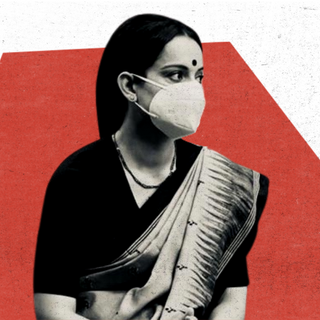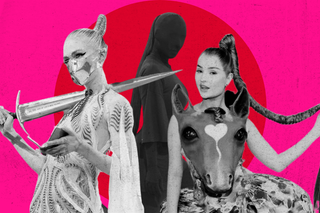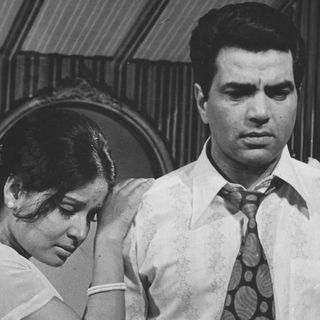
Everyone Laughs at Met Gala Costumes, but Not Gen Z and Not This Year
The memes were tepid and young fans unsatisfied. Gen Z is growing impatient with splashy events trying to be ‘woke’ without sincerity.

Something about the Met Gala in 2021 was off. The most awaited night in fashion was less awaited this year. Usually ripe for internet meme pickings, the event’s relatively more avant-garde costumes passed without much comment, despite the ball featuring its very first ‘meme correspondent.’ Are the days of light-hearted banter over Rihanna’s omelette dress, Priyanka Chopra’s repurposable trench coat, and Cardi B’s red blood cell dress gone?
As a spectacle, the Met has captured the public’s imagination of how far it pushes fashion and the cultural moments it responds to. Widely considered to be the “barometer of fashion,” the Met has in recent years been a place for attendees to compete with one another and with themselves in terms of just how bold and beautiful they can be. As a result, the gala treated the millions of eyes fixated on the event to costumes that grew more audacious year after year, inspiring a wealth of memes and making it a cultural staple. The humour, awe, and fascination it attracted and the fact that it was fair game for commentary, consumption, and laughter across demographics set the Met Gala apart from other fashion events in recent years. This year, however, things were different. All eyes were on the politics that celebrities brought to their costly tables.
It wasn’t as if the gala was lacking in memeable, laughable material. Kim Petras showed up in a horse dress, Frank Ocean inexplicably showed up with a bright green baby, and Kim Kardashian showed up in something that entirely defied explanation. And yet, none of these, save for a tiny trickle of memes likening Kim K to dementors, the alien from Predator, or a visual representation of anxiety/depression (in itself telling), captured much of the internet’s attention. The few laughs that Gen Z spared had a patina of wry amusement bordering on mockery. By and large, however, the general tone of response seems to be disillusionment. More specifically, the outfits themselves barely captured Gen Z’s — the most online generation alive — attention.
That they are more aware of how politicians, governments, and billionaires are failing them, leaving them doomed to inheriting a planet sucked dry of all its life-giving qualities, maybe a reason why. A global Lancet study conducted across 10 countries and released on the same day as the gala said that over half of the world’s youth are anxious about their futures due to climate change. Four in 10 young people fear having children, and an even greater number is terrified to the point of numbness at their prospects.
In addition to general existential dread, the Met Gala (which was cancelled last year) took place against the backdrop of the Covid19 catastrophe that, arguably, changed everything about modern life and culture as we knew it. Young people shifted back to their homes to finish their education, the job market is in shambles, the future is uncertain, and the usual milestones of youth have all but been stolen from millions of people. This, against the unexpected and untimely death of loved ones, all putting life plans and ambitions through the wringer.
Is that why those quick to meme are not laughing just as much this time?
Related on The Swaddle:
Gen Z Prefers Renting Clothes Over Buying Them to Reduce Consumption, Study States
It would appear so. Instead of making jokes, young people on the internet focused much of the attention on the ball attendees who did try to address some of these anxieties, albeit somewhat underwhelmingly. Supermodel Cara Delevingne donned a vest with the words ‘peg the patriarchy’ inscribed on the front. Footballer Megan Rapinoe topped off her star-spangled banner themed outfit with a little blue clutch, pithily stating, ‘in gay we trust.’ American Congresswoman Carolyn Maloney showed up in an elaborate suffragette dress with the words ‘equal rights for women.’ These were all widely acknowledged to be toothless nothings, for the most part.
But the most controversial of them all was American House of Representatives member Alexandria Ocasio-Cortez, who wore a white ballgown with the words ‘tax the rich’ emblazoned in bright red across the back. While several of the other outfits merely made it to the regular ‘see the best looks from the night’ listicle fare, it was Ocasio-Cortez’s dress that dominated internet conversations and think pieces.
The big question about the night was on performative activism; people are now asking questions about the power and influence of celebrities in pushing change. But it seems that the ones who tried, failed to rise to the occasion.
‘Stan’ culture was noticeably absent too. Instead, distant observers noted with disdain how the police clashed with a Black Lives Matter protest outside the venue, making for a striking contrast against the diversity in both stars and fashion on display on the iconic Met staircase. This is particularly striking, given that Gen Z is given partial credit for inventing stan culture.
Further, the usual Met Gala favourite Rihanna was met with a lukewarm response, her fashionably late entrance falling flat in the process. Only Billie Eilish, a celebrated Gen Z-er, was uniformly praised for her stunning Oscar de la Renta gown. But a part of the praise was also that Eilish reportedly made the luxury fashion house promise to retire furs from their designs entirely. It is possible that this was a trade that made Eilish an unproblematic favourite this year.
The idea signals a larger tectonic shift in celebrity culture: nobody has patience for the vacuity and narcissism of fame anymore. It now appears that people who are given a platform need to earn their right to keep it.
The theme this year was ‘In America: A Lexicon in Fashion.’ “I’ve been really impressed by American designers’ responses to the social and political climate, particularly around issues of body inclusivity and gender fluidity, and I’m just finding their work very, very self-reflective,” Andrew Bolton, curator of the Met’s Costume Institute, told Vogue. Much of the fare, however, was dominated by nods to the Statue of Liberty, the Wild West, stars and stripes, red, blue and white, and other cultural iconography that is quintessentially ‘American.’ But American to whom, and whose America, is another question that lingers. Noor Tagouri, for one, asked where the hijabs were.
“This year’s Met hits differently. It was never about the event itself — it is about the pinnacle of fashion, an industry that helps shape our identities, rejecting an entire group of people it claims to serve only when convenient,” she writes.
Related on The Swaddle
Closeness to Climate Change and Pollution Can Cause Distress, Environmental Grief
Poverty and war are on the rise, and marginalized people are bearing their brunt more than ever. Fashion’s previous attempts to respond to crises creating large-scale suffering have included, among others, removing flashy logos and recognizable designs from couture after the 2008 recession. It is no wonder, then, that Gen Z is not buying half-hearted or tokenistic gestures towards progressiveness. While every global crisis arguably causes disenchantment with rich people romps such as the Met Gala, they soon fade away as the crisis recedes into the past. But with the climate crisis coming from the opposite direction — the future — and the immediate, devastating threat it poses to those very, very far away from the long, glossy steps of the Met, how will splashy cultural moments rise to the occasion of addressing them?
This year, Met attendees tried to answer that with ‘activist couture.’ (Should we be resisting an eye roll?) But merely looking the part isn’t enough. “No one here is rebelling against the Man. The Man loves the extra publicity; it helps sell more $35,000 tickets to socialites who love a frisson of revolution as long as it’s safely divorced from the threat of actual tumbrels,” writes Helen Lewis for The Atlantic. Notably, attendees are not required to pay the steep price for the ticket but are given access to it all the same, with a show-stopping costume to boot. We need more, is what Gen Z seems to be saying. But are the celebrities listening?
That the Met Gala is a spectacle where the grand and the garish bleed into one another is a given. Fashion and art are often inaccessible and meant for gazing at from afar, and the Met Gala looks are undeniably captivating. Most of us don’t go to the Louvre to “buy” a da Vinci but to look at it, be around it, maybe learn something in the process about how we look at culture today. Maybe this inaccessibility in ownership is okay; maybe it’s not.
But the artsy-fartsy Met Gala is a venue for those with unending platforms to bare their hearts, to show us what they care about, even if that “about” is themselves. They don’t all have to be activists in the eyes of the young, just sincere. Gen Z couldn’t find any in all the layers their idols hid under at this year’s Met. This time, the memes just won’t cut it.
Rohitha Naraharisetty is a Senior Associate Editor at The Swaddle. She writes about the intersection of gender, caste, social movements, and pop culture. She can be found on Instagram at @rohitha_97 or on Twitter at @romimacaronii.
Related


Woe Is Me! “I Cheated on My Boyfriend With a Friend. How Do I Not Lose Them Both?”
